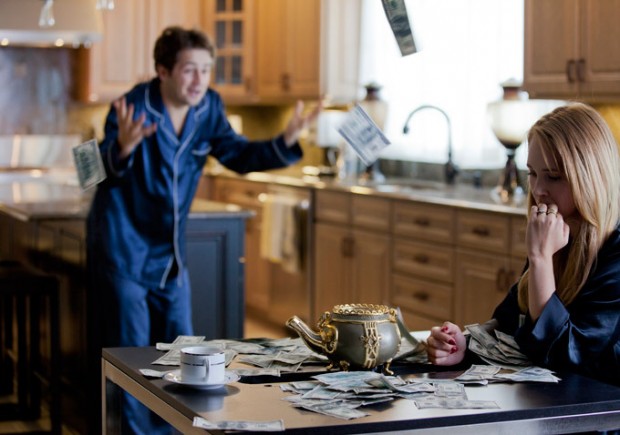A few years ago a professor of mine once cautioned that when times get tough, young people are more likely to sell their soul for cash, allowing themselves to be exploited. The Brass Teapot is a film that mixes allegories so much it refuses to be read as one thing or another; perhaps we should just consider it on the grounds that its a dark comedy presented as a fable.
John (Michael Angarano) is a telemarketer with a college degree in an office of GEDs, while Alice (Juno Temple) just received a BA in Art History and submits for management positions she’s not qualified for. They live in a small, economically-divided Indiana town (where everyone gets married it would seem, at some point during college) and struggle to pay the bills.

After a car accident caused by a missing stop sign, Alice discovers an off-the-beaten-path antique shop where she steals a magic brass teapot for reasons unknown to her (and us – although we gather she’s nuts). The craziness doesn’t help once its discovered the teapot when in the proximity to pain and suffering prints money, what starts as stubbing her toe, leads to a full Brazilian, tattoos, picking fights, and the consideration of homicide. The young couple laughs all the way to the bank and then some – moving up from house rented by a creepy young landlord to a Mc-Mansion, BMW and the “American Dream”.
The biggest payout is for emotional trauma and we get that too as the couple turns on each other. Enough is enough: this feature was expanded from director Ramaa Mosley’s 22-minute 2007 short into a 101 minute feature losing what I gather was the simplicity of the short. At 101 minutes the film feels about 20 minutes too long to sustain what is a simple concept — adding in characters that feel under utilized (especially considering the talent playing them) including Bobby Moynihan as Chuck, John’s pal, married to Louise (Alia Shawkat) and Alexis Bledel as Payton, the town’s rich bitch.
It’s a far stretch to the call the film realistic, but while it turns to gags and could have some fun with Alice’s family (including her sister Mary, played by Lucy Walters, whose married to a proud vegan, played by Jack McBrayer) it edges away from social commentary. It’s a bland copout, instead of going for a timely approach and fully committing, it goes for the less interesting timeless approach.
There’s a certain amount of risk involved with the timeliness approach. Although The Brass Teapot is about human nature, greed, and ultimately faithfulness, the point I first made about young people struggling and the willingness to engage in self-exploitation could be made with a good deal of fun and social commentary. I just want the film to commit: unlike the couples in the film, the film itself has a fear of commitment.
The Brass Teapot is currently on VOD and in limited release.

